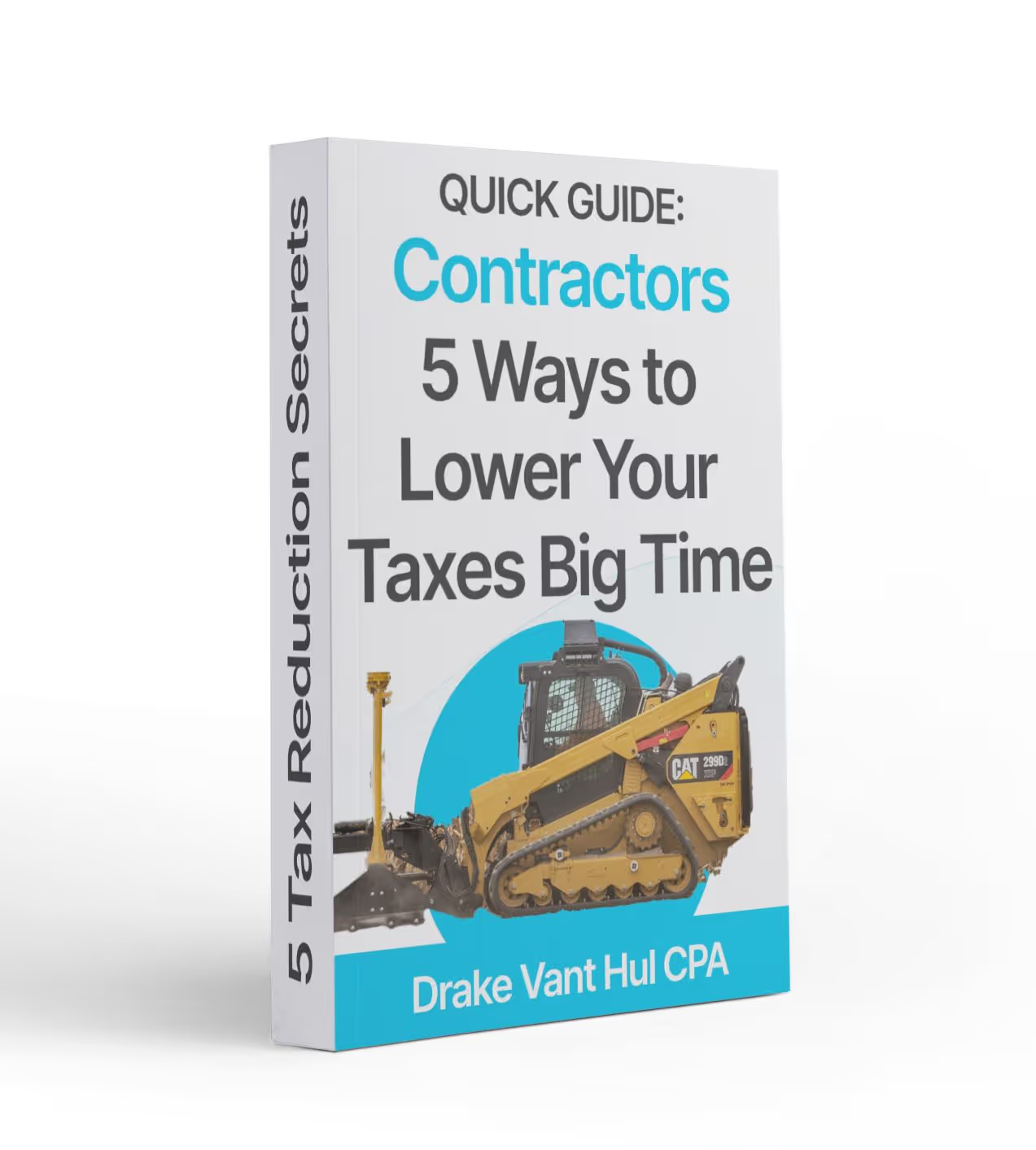Choosing the wrong business structure can cost Ankeny construction companies thousands of dollars annually in unnecessary taxes. With Iowa's business-friendly environment and growing construction market, the decision between S-Corporation and Limited Liability Company (LLC) structures has never been more critical.
Bottom Line Up Front: Most profitable Ankeny construction companies benefit significantly from S-Corp election, with potential tax savings of $15,000-$30,000 annually for businesses generating $200,000+ in profit. However, the right choice depends on specific circumstances, growth plans, and operational preferences.
The Stakes: Why Business Structure Matters for Iowa Contractors
Construction companies in Ankeny face unique challenges that make business structure selection crucial. The seasonal nature of construction, equipment-heavy operations, and project-based revenue streams all impact how different structures perform tax-wise.
Consider this: A successful excavation contractor in Ankeny generating $400,000 in annual profit could save approximately $25,000 per year by choosing the optimal structure and implementing proper tax strategies.
The construction boom in Ankeny—driven by residential developments like Prairie Trail and commercial growth along the I-35 corridor—means more contractors are hitting profit levels where structure choice becomes financially significant.
Understanding Your Options: LLC vs S-Corp Basics
Limited Liability Company (LLC)
An LLC provides liability protection while offering operational flexibility. For tax purposes, single-member LLCs are treated as sole proprietorships, while multi-member LLCs are treated as partnerships (unless they elect corporate taxation).
Key LLC Characteristics:
- Simple operational requirements
- Flexible profit and loss allocation
- No restrictions on number or type of owners
- Pass-through taxation (profits taxed once at owner level)
- Self-employment tax on all business profits
S-Corporation Election
An S-Corp is a tax election that can be made by an LLC or a regular corporation. This election fundamentally changes how business profits are taxed while maintaining liability protection.
Key S-Corp Characteristics:
- Must pay reasonable salary to owner-employees
- Remaining profits pass through without self-employment tax
- More complex operational requirements
- Restrictions on ownership (100 shareholders max, no foreign ownership)
- Potential for significant self-employment tax savings
The Tax Mathematics: Real Numbers for Ankeny Contractors
Let's examine how these structures affect a typical Ankeny construction company:
Example: Successful Roofing Contractor
- Annual Business Profit: $300,000
- Owner Takes: $200,000 for personal use
- Business Retains: $100,000 for equipment and growth
LLC Tax Scenario (Default Treatment)
- Self-Employment Tax: $300,000 × 15.3% = $45,900
- Federal Income Tax: ~$52,000 (assuming married filing jointly)
- Iowa State Tax: ~$18,000
- Total Tax Burden: ~$115,900
S-Corp Election Scenario
- Reasonable Salary: $120,000
- Self-Employment Tax: $120,000 × 15.3% = $18,360
- Salary Payroll Taxes: ~$9,180 (employer portion)
- Pass-through Income: $180,000 (no SE tax)
- Federal Income Tax: ~$52,000
- Iowa State Tax: ~$18,000
- Total Tax Burden: ~$97,540
Annual Savings with S-Corp Election: $18,360
This example shows how S-Corp election can generate substantial tax savings for profitable construction companies.
When S-Corp Election Makes Sense for Ankeny Contractors
Profit Threshold Guidelines
The S-Corp election typically becomes beneficial when business profits exceed $60,000-$80,000 annually. For construction companies, we generally recommend considering S-Corp election when:
- Annual profits exceed $100,000 consistently
- Owner-operator takes significant distributions from the business
- Business is profitable and growing
- Administrative complexity can be managed effectively
Construction Industry Advantages
Construction companies often benefit more from S-Corp election due to:
Seasonal Cash Flow Patterns: Construction profits often concentrate in certain months, making salary planning and distribution timing valuable for tax optimization.
Equipment Purchase Flexibility: S-Corp structure allows strategic timing of equipment purchases and Section 179 deductions to optimize both corporate and personal tax situations.
Multi-State Project Considerations: For contractors working across state lines, S-Corp election can provide advantages in managing multi-state tax obligations.
Iowa-Specific Considerations
Iowa S-Corp Tax Benefits
Iowa recognizes federal S-Corp elections, providing additional benefits:
- State-Level Pass-Through: Iowa taxes S-Corp income at individual rates (up to 8.53%) rather than corporate rates
- Built-in Gains Relief: Iowa provides favorable treatment for certain built-in gains situations
- Simplified Filing: Iowa S-Corp returns are generally less complex than corporate returns
Iowa Construction Industry Factors
Several Iowa-specific factors influence structure choice for construction companies:
Seasonal Employment Patterns: Iowa's construction season affects payroll planning for S-Corp elections, requiring careful salary structuring to accommodate seasonal variations.
Equipment Investment Incentives: Iowa offers various tax incentives for equipment purchases that interact differently with LLC vs. S-Corp structures.
Multi-County Operations: Many Ankeny contractors work across multiple Iowa counties, and S-Corp election can simplify certain local tax obligations.
Operational Differences: Beyond Tax Savings
S-Corp Compliance Requirements
Electing S-Corp status introduces additional operational obligations:
Payroll Processing: Owner-employees must receive regular paychecks with proper payroll tax withholding and reporting.
Corporate Formalities: Regular board meetings, corporate resolutions, and maintained corporate records become important for maintaining S-Corp status.
Banking and Accounting: Separate business checking accounts and more complex bookkeeping requirements to track salary vs. distribution components.
Quarterly Obligations: Estimated tax payments and payroll tax deposits require more frequent attention.
LLC Operational Simplicity
LLCs maintain operational advantages:
Flexible Distributions: Members can take money from the business without payroll processing requirements.
Simplified Record-Keeping: Fewer formal requirements for documentation and corporate governance.
Management Flexibility: LLCs can be member-managed or manager-managed without complex governance structures.
Common Mistakes Ankeny Contractors Make
1. Inadequate Reasonable Salary
The IRS requires S-Corp owner-employees to pay themselves a "reasonable salary" for services performed. Many contractors underestimate this requirement, setting salaries too low to maximize pass-through income benefits.
Construction Industry Benchmarks:
- Project managers: $65,000-$85,000
- General contractors: $80,000-$120,000
- Specialized trade contractors: $70,000-$100,000
2. Poor Timing of Election
S-Corp elections must be made by specific deadlines. Missing these deadlines can cost a full year of potential savings.
Key Dates:
- New entities: Within 75 days of formation
- Existing entities: By March 15 for current year election
- Late elections: Possible but complex and not guaranteed
3. Ignoring State-Level Implications
While federal S-Corp treatment is clear, some states handle S-Corp elections differently. Iowa generally follows federal treatment, but contractors operating in multiple states need careful planning.
4. Inadequate Documentation
S-Corp elections require proper documentation of corporate activities, salary justification, and distribution decisions. Poor documentation can jeopardize the election during IRS audits.
Advanced Strategies for Construction Companies
Equipment Purchase Optimization
S-Corp structure provides unique opportunities for equipment purchase timing:
Corporate Level Purchases: Equipment purchased by the S-Corp generates depreciation deductions at the corporate level, while avoiding self-employment tax on related profits.
Section 179 Coordination: Strategic coordination of Section 179 elections between corporate and personal returns can optimize overall tax benefits.
Bonus Depreciation Planning: Timing equipment purchases around year-end can provide significant tax benefits under S-Corp structure.
Multi-Entity Structures
Some construction companies benefit from multiple entity structures:
Operating Company (S-Corp): Handles day-to-day construction operations
Equipment Holding Company (LLC): Owns and leases equipment to the operating company
Real Estate Holding Company: Owns business real estate and facilities
This structure can optimize taxation, liability protection, and succession planning.
Succession and Exit Planning
S-Corp structure provides advantages for business succession:
Gradual Ownership Transfer: Easier to transfer partial ownership to family members or key employees
Valuation Benefits: S-Corp stock transfers can qualify for various tax benefits
Buy-Sell Agreements: More straightforward to structure buy-sell agreements with S-Corp shares
Implementation Strategy: Making the Change
Step 1: Financial Analysis
Work with a construction-specialized CPA to analyze your specific situation:
- Project 3-5 year profit trends
- Calculate potential tax savings
- Evaluate operational complexity increases
- Consider growth and exit planning needs
Step 2: Legal Structure Review
Ensure your current LLC operating agreement or corporate structure supports S-Corp election:
- Review ownership restrictions
- Update governing documents as needed
- Confirm state-level compliance requirements
- Plan for operational changes
Step 3: Implementation Planning
Develop a comprehensive implementation timeline:
- File S-Corp election forms (Form 2553)
- Establish payroll processing systems
- Update banking and accounting procedures
- Implement corporate compliance procedures
Step 4: Ongoing Optimization
S-Corp election requires ongoing management:
- Regular salary benchmarking reviews
- Distribution planning and timing
- Corporate compliance maintenance
- Annual tax strategy sessions
Case Studies: Ankeny Construction Companies
Case Study 1: Growing Electrical Contractor
Situation: Established electrical contractor with $250,000 annual profit, considering expansion.
Challenge: High self-employment taxes limiting growth capital availability.
Solution: S-Corp election with $90,000 reasonable salary.
Results:
- Annual tax savings: $16,200
- Increased reinvestment capacity
- Simplified expansion financing due to better cash flow
Case Study 2: Family Homebuilding Business
Situation: Second-generation homebuilder preparing for father's retirement.
Challenge: Need structure supporting ownership transition while maintaining tax efficiency.
Solution: S-Corp election with gradual stock transfer to next generation.
Results:
- Successful ownership transition over 5 years
- Maintained tax benefits throughout transition
- Preserved family business legacy
Case Study 3: Multi-Trade Contractor
Situation: Contractor offering multiple services (plumbing, HVAC, electrical) with $400,000+ profits.
Challenge: Complex operations with multiple revenue streams and varying profit margins.
Solution: S-Corp election with detailed job costing integration for salary justification.
Results:
- $22,000+ annual tax savings
- Better understanding of service line profitability
- Improved business decision-making
Professional Guidance: Why Expertise Matters
Construction industry tax planning requires specialized knowledge of:
- Industry-specific deduction opportunities
- Equipment depreciation strategies
- Multi-state compliance issues
- Seasonal cash flow management
- Business succession planning
Working with construction-focused accounting professionals ensures optimal structure selection and ongoing compliance management.
Making Your Decision: Key Questions to Consider
Before choosing between LLC and S-Corp election, consider:
- Profit Level: Do you consistently generate $100,000+ in annual profits?
- Growth Plans: Are you planning significant business expansion?
- Operational Complexity: Can you manage additional compliance requirements?
- Long-term Goals: Do you plan to sell, transfer, or exit the business?
- Multi-State Operations: Do you work in multiple states?
Take Action: Optimize Your Construction Business Structure
Don't let another tax year pass without optimizing your business structure. The potential savings are too significant to ignore, and proper planning takes time to implement effectively.
Immediate Steps:
- Calculate Your Potential Savings: Use our tax reduction analysis to estimate benefits
- Review Current Structure: Analyze your LLC operating agreement and tax elections
- Plan Implementation Timeline: Allow adequate time for proper setup and compliance
- Consider Professional Guidance: Ensure optimal structure selection and implementation
Performance Financial CPA specializes in construction company tax planning and business structure optimization for Iowa contractors. Our team understands the unique challenges facing Ankeny construction companies and provides comprehensive solutions for:
- Business structure analysis and optimization
- S-Corp election and ongoing compliance
- Tax reduction planning and implementation
- Construction industry accounting and bookkeeping
- Business growth and succession planning
Ready to optimize your construction company's tax strategy?
Schedule your Tax & Accounting Analysis today and discover how much you could save with the right business structure. Our comprehensive review includes:
- Current structure analysis and optimization recommendations
- 3-year tax savings projections
- Implementation timeline and requirements
- Ongoing compliance and optimization strategies
Take control of your construction company's tax burden and invest those savings back into growing your business in Ankeny's thriving construction market.
Contact our team at Performance Financial today to get started!
Schedule a Tax & Accounting Analysis Now
Step 1 - Fill out the form below.
Step 2 - Select a time.
Step 3 - Provide documents.











